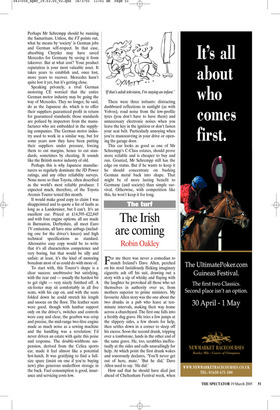Reputations on the line
Alan Judd
Do the Japanese do it better and, if so, why? They certainly do it better than Mercedes which, in the past decade, has sunk from 1st to 28th in the US JD Power reliability survey. Many of its recent problems are due to over-complex electronics, which the company claims it is addressing, but there is plenty of anecdotal evidence that the rest of the car is no longer engineered as it was.
Swallowing Chrysler in 1998 stretched Mercedes’s resources so much that the group’s market value later halved. Some 34,000 US job cuts later, Chrysler is profitable once again, but in its effort to digest it Mercedes has put today’s profit above lasting quality. That’s understandable in short-term accountancy terms, but since its quality was the source of its status, and that status the source of its profits, it’s a compromise that cuts at the root of its success. On top of this, it lost a fortune in a failed alliance with Mitsubishi and is continuing to haemorrhage money on its financially disastrous engineering success, the Smart.
All these decisions were the responsibility of chief executive, Jurgen Schrempp. This is the man who said, in a recent Financial Times interview, ‘The ultimate way of how someone is judged having run a company is not only the bottom line. It is whether we have made a contribution to society. This point is close to my heart.’ Perhaps Mr Schrempp should be running the Samaritans. Unless, the FT points out, what he means by ‘society’ is German jobs and German self-respect. In that case, absorbing Chrysler may have saved Mercedes for Germany by saving it from takeover. But at what cost? Your product reputation is your most valuable asset. It takes years to establish and, once lost, more years to recover. Mercedes hasn’t quite lost it yet, but it’s getting close.
Speaking privately, a rival German motoring CE worried that the entire German motor industry may be going the way of Mercedes. They no longer, he said, do as the Japanese do, which is to offer their suppliers guaranteed profit in return for guaranteed standards; those standards are policed by inspectors from the manufacturer who are embedded in the supplying companies. The German motor industry used to work in a similar way, but for some years now they have been putting their suppliers under pressure, forcing them to cut margins, hence to cut standards, sometimes by cheating. It sounds like the British motor industry of old.
Perhaps this is why Japanese manufacturers so regularly dominate the JD Power ratings, and any other reliability surveys. None more so than Toyota, often described as the world’s most reliable producer. I expected much, therefore, of the Toyota Avensis Tourer tested this month.
It would make good copy to claim I was disappointed and to quote a list of faults as long as a Landcruiser, but I can’t. It’s an excellent car. Priced at £14,595–£22,845 and with four engine options, all are made in Burnaston, Derbyshire, all meet Euro 1V emissions, all have nine airbags (including one for the driver’s knees) and high technical specifications as standard. Alternative easy copy would be to write that it’s all characterless competence and very boring, but that would be silly and unfair; at least, it’s the kind of motoring boredom most of us could do with more of.
To start with, this Tourer’s shape is a clear success: unobtrusive but satisfying, with the rear end — usually the hardest bit to get right — very nicely finished off. A six-footer may sit comfortably in all five seats, with his cap on, and with the seats folded down he could stretch his length and snooze on the floor. The leather seats were good, though with lumbar support only on the driver’s, switches and controls were easy and clear, the gearbox was crisp and precise, the mid-range two-litre engine made as much noise as a sewing machine and the handling was a revelation: I’d never driven an estate with quite this poise and response. The double-wishbone suspension, derived from the Celica sports car, made it feel almost like a potential hot-hatch. It was gratifying to find a fullsize spare (insist on one if you’re buying new) plus generous underfloor storage in the back. Fuel consumption is good, insurance and servicing costs low. There were three irritants: distracting dashboard reflections in sunlight (as with Volvos), road noise from the low-profile tyres (you don’t have to have them) and unnecessary electronic noises when you leave the key in the ignition or don’t fasten your seat belt. Particularly annoying when you’re manoeuvring in your drive or opening the garage door.
This car looks as good as one of Mr Schrempp’s C-Class estates, should prove more reliable and is cheaper to buy and run. Granted, Mr Schrempp still has the edge on status. But if he wants to keep it he should concentrate on bashing German metal back into shape. That might be of more lasting benefit to Germany (and society) than simple survival. Otherwise, with competition like this, he won’t keep it for long.

















































 Previous page
Previous page